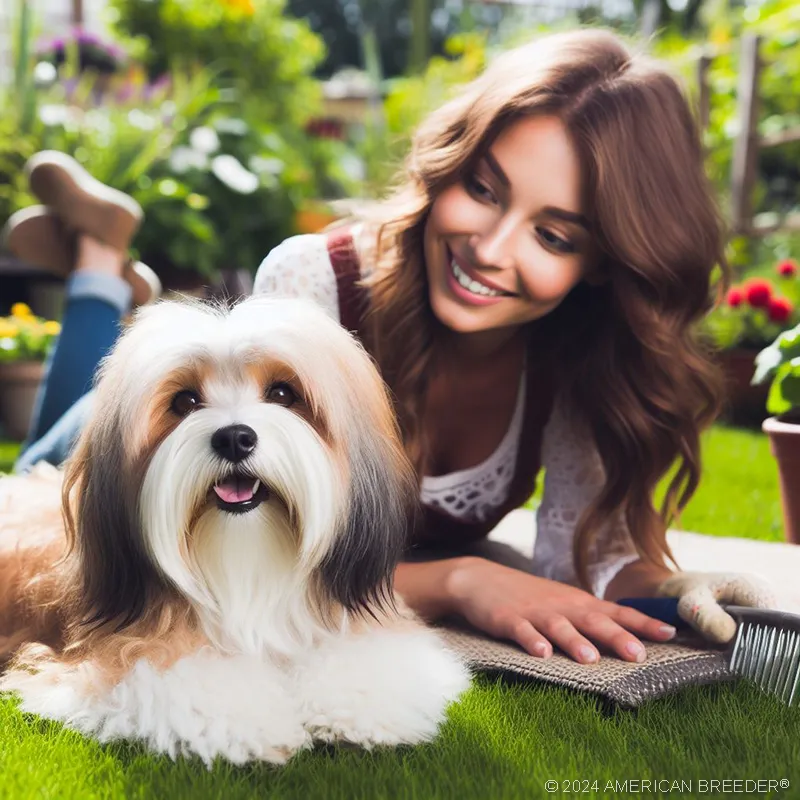Journey into the Heart of Havanese Dogs
Introduction
 The Havanese Dog, a breed brimming with charm and character, is a beloved companion that brings endless joy to families worldwide. With their endearing nature and captivating presence, Havanese Dogs have woven their way into the hearts of many, earning their place as cherished members of countless households.
The Havanese Dog, a breed brimming with charm and character, is a beloved companion that brings endless joy to families worldwide. With their endearing nature and captivating presence, Havanese Dogs have woven their way into the hearts of many, earning their place as cherished members of countless households.
Background
The Havanese is a small-to-medium-sized breed known for its playful demeanor, luxurious coat, and expressive eyes that radiate warmth and affection. Originating from Cuba, this breed was originally a favorite among the island's aristocracy. Over time, they evolved into companion dogs cherished for their loving personalities and adaptable nature.
Considerations Before Choosing
Prospective Havanese owners should be prepared to invest time in grooming, as their lush coat requires regular care to maintain its beauty and prevent matting. Additionally, due to their affectionate and social nature, Havanese Dogs thrive on companionship and may experience separation anxiety if left alone for extended periods.
Interesting Facts and Fun Facts
Aside from being known as the "National Dog of Cuba," the Havanese breed boasts other intriguing facts. Their nickname "Velcro dog" aptly describes their affinity for sticking close to their owners, seeking constant affection and attention. With roots tracing back to the 16th century, the Havanese has a rich history interwoven with Cuban culture and aristocracy.
Breed Background and History
 Origin and Development
Origin and Development
The Havanese can trace its ancestry to bichon-type dogs brought to Cuba by Spanish colonists and later interbred with local dogs. These charming canines became cherished companions of Cuba's upper class, finding favor among sugar planters and aristocrats alike. Over time, they became ingrained in the cultural tapestry of the country, symbolizing prosperity and affection.
Historical Significance or Cultural Relevance
The Havanese's historical significance extends beyond their role as companions. Their endearing qualities and charismatic presence made them a fixture in Cuban households, where they earned their reputation as delightful family pets. Their role as "little circus dogs" further demonstrates their versatility, as they were often taught tricks and entertained families with their playful antics.
Purpose or Original Use
While their initial role was one of companionship, Havanese Dogs also excelled as watchful alarm barkers, alerting their owners to potential intruders. Their keen senses and loyalty to their families made them effective in this role, adding an extra layer of protection to their affectionate nature.
Kennel Clubs that Classify, Group, or Register the Havanese Dog
The American Kennel Club (AKC) classifies the Havanese as a member of the Toy Group, recognizing their compact size and delightful personality. Their registration by the AKC further solidifies their place in the hearts of dog enthusiasts around the world.
Appearance
 Size, Weight, Activity Level, and Physical Appearance
Size, Weight, Activity Level, and Physical Appearance
Havanese Dogs typically stand between 8.5 to 11.5 inches tall at the shoulder and weigh around 7 to 13 pounds. Despite their small size, they are robust and well-proportioned, exuding an air of elegance and confidence. Their distinctive topline, which is level from withers to croup, gives them a poised and harmonious appearance.
Coat Type, Color Variations, and Patterns
One of the Havanese's most striking features is their luxurious double coat. The outer coat is soft and silky, while the undercoat provides insulation and warmth. Their coat comes in a variety of colors, including white, black, blue, silver, cream, and more. The breed standard allows for a wide range of color variations, adding to their individuality and charm.
Distinctive Features or Markings
Beyond their coat, Havanese Dogs are known for their expressive eyes that radiate intelligence and affection. Their large, dark eyes are a hallmark of the breed, enhancing their endearing and soulful gaze. Additionally, their plumed tail, which arches over their back, adds a touch of elegance to their overall appearance.
Average Litter Size
Havanese litters tend to be relatively small, with an average size of around four to six puppies. Their nurturing and devoted nature extends to their role as mothers, ensuring that their puppies receive the care and attention needed for healthy development.
This comprehensive guide aims to provide a deeper understanding of the Havanese Dog, from their origins and history to their appearance and distinctive traits. As we continue through subsequent chapters, we'll explore their temperament, care requirements, training, health considerations, and more, painting a complete portrait of this captivating breed.
Temperament and Personality
Typical Temperament Traits and Behavior Tendencies
The Havanese Dog's temperament is a harmonious blend of affection, intelligence, and playfulness. They are renowned for their sociable nature and adapt well to various living situations, making them a great fit for families, singles, and seniors alike. Their friendly disposition extends beyond their immediate family, often making them welcoming to strangers and eager to engage in interactions.
Energy Levels and Activity
Despite their small stature, Havanese Dogs possess a surprising amount of energy. They enjoy a mix of indoor and outdoor activities, whether it's a spirited game of fetch in the yard or a cozy cuddle session on the couch. Regular exercise and mental stimulation are essential to keep them happy and content.
 Compatibility with Different Lifestyles and Family Dynamics
Compatibility with Different Lifestyles and Family Dynamics
Havanese Dogs thrive in a range of living environments, adapting to both city apartments and suburban homes. Their size and temperament make them well-suited for apartment living, provided they receive adequate exercise and mental stimulation. They also make wonderful family companions, forming strong bonds with children and adults alike.
List of Typical Behavior Issues
Aggression and Biting: While Havanese Dogs are generally gentle, proper socialization from a young age is crucial to prevent any aggressive tendencies. Early exposure to various people, places, and situations can help reduce the likelihood of fear-based behaviors.
Excessive Barking: Havanese Dogs are communicative by nature, which can sometimes manifest as excessive barking. Training and consistent positive reinforcement can help curb this behavior and teach them appropriate times to express themselves vocally.
Digging Behavior: Some Havanese Dogs may indulge in digging, a behavior that often stems from boredom or a desire to explore. Providing engaging toys and creating a designated digging area can redirect this behavior in a positive direction.
Separation Anxiety: Their strong attachment to their owners can lead to separation anxiety when left alone. Gradual training and routines can help ease their distress and ensure they feel secure even when their human companions are away.
Resource Guarding: Havanese Dogs may show possessive tendencies over toys, food, or other items. Early training that emphasizes sharing and positive reinforcement can help mitigate this behavior and foster a cooperative attitude.
Fear and Phobias: Their sensitive nature means that some Havanese Dogs may develop fears or phobias, such as loud noises or unfamiliar environments. Gentle exposure and positive experiences during puppyhood can help prevent the development of deep-seated fears.
Understanding these behavior issues and taking proactive measures to address them will contribute to a harmonious relationship with your Havanese Dog. By fostering a nurturing and supportive environment, you can help your Havanese thrive and showcase their delightful personality.
Trainability and Intelligence
Trainability Level and Ease of Learning
Havanese Dogs possess a high level of intelligence and a willingness to please, making them receptive to training and eager learners. They thrive on positive reinforcement methods, responding well to praise, treats, and play as rewards for their achievements. Consistency and patience are key when training a Havanese, as they may become disinterested or lose focus if sessions are too long.
 Willingness to Please Their Owner
Willingness to Please Their Owner
This breed's desire to please their owners is deeply ingrained, making training a delightful and mutually rewarding experience. They eagerly engage in various activities and commands, often exhibiting a joyful enthusiasm that resonates with their human companions.
Intelligence and Problem-Solving Abilities
An impressive level of intelligence that extends beyond basic obedience. They have an aptitude for problem-solving and enjoy engaging in activities that challenge their minds. Introducing puzzle toys, scent work, and interactive games can harness their cognitive abilities and prevent boredom.
Recommended Training Approaches and Techniques
Positive reinforcement is the cornerstone of effective Havanese training. Utilizing treats, praise, and play to reward desired behaviors not only motivates them but also strengthens the bond between owner and dog. Keep training sessions short and engaging to maintain their interest, and be sure to vary the exercises to prevent monotony.
Training or Skills Best Suited for Havanese Dogs
Havanese Dogs excel in a variety of training endeavors due to their intelligence and versatility. From basic obedience commands like sit, stay, and come to more advanced tricks and agility training, they are enthusiastic learners who relish the opportunity to showcase their talents.
As you embark on the training journey with your Havanese Dog, remember that their positive attitude and eagerness to learn make them wonderful candidates for a range of activities. Whether you're teaching them new tricks, engaging in agility courses, or simply reinforcing good manners, the journey of learning together is an enriching and fulfilling experience for both you and your furry friend.
Practical Considerations
Size of Sleeping Quarters Depending on Size
When providing a comfortable sleeping space for your Havanese, consider their size and individual preferences. A cozy dog bed or crate with soft bedding offers a secure retreat where they can rest and recharge.
Typical Annual Veterinary Cost
Routine veterinary care is essential to maintaining your Havanese's health and well-being. Annual check-ups, vaccinations, and preventive treatments can amount to an average cost of $300 to $600, ensuring they remain in optimal condition.
 Type of Grooming and Annual Cost
Type of Grooming and Annual Cost
Havanese Dogs require regular grooming to keep their luxurious coat healthy and free from mats. The annual cost for grooming can range from $500 to $1,000, covering professional grooming sessions, grooming tools, and supplies.
Daily Exercise Needs and Requirements
Engaging your Havanese in daily exercise is crucial for their physical and mental well-being. Aim for at least 30 minutes of moderate exercise, which can include brisk walks, interactive play, and mentally stimulating games.
Level of Playfulness
Havanese Dogs are renowned for their playful nature, which is an integral part of their overall temperament. Engaging in interactive play not only provides physical exercise but also strengthens the bond between you and your furry companion.
Level of Intelligence
Their high level of intelligence allows Havanese Dogs to grasp commands and concepts quickly. Engaging them in brain-stimulating activities, such as puzzle toys and obedience training, ensures they remain mentally sharp and engaged.
Affection Level and Desired Attention
Affection is at the core of the Havanese's personality. They thrive on human interaction and form strong emotional bonds with their owners, seeking out cuddles, playtime, and companionship.
Friendliness Toward Strangers
Havanese Dogs typically display a friendly and approachable demeanor toward strangers. Their social nature makes them amicable companions in various social settings.
Grooming Needs and Frequency
Grooming is an integral part of Havanese care, and the frequency depends on their coat type. Regular brushing, bathing, and grooming sessions are essential to prevent matting and maintain their coat's lustrous appearance.
 Feeding Requirements and Dietary Considerations
Feeding Requirements and Dietary Considerations
Proper nutrition is vital for the overall health and well-being of your Havanese Dog. Their diet should be balanced, providing a combination of high-quality commercial dog food and occasional healthy treats. Consult with your veterinarian to determine the appropriate portion sizes and feeding schedule based on their age, size, and activity level.
Portion Sizes
Portion sizes for Havanese Dogs can vary based on factors such as age, weight, metabolism, and activity level. Generally, a high-quality dog food brand's recommendations on the packaging can serve as a starting point. Adjust portion sizes as needed to maintain a healthy weight.
Feeding Schedule
Establish a consistent feeding schedule that aligns with your Havanese's daily routine. Most adult Havanese Dogs thrive on two meals a day, while puppies may require three meals. Regular feeding times help regulate their digestion and prevent overeating.
Recommended Dog Food Brands/Types
Opt for well-balanced commercial dog food that meets the nutritional needs of your Havanese. Look for options with high protein content, healthy fats, and essential vitamins and minerals. Consult your veterinarian for recommendations based on your dog's individual needs.
Treats and Dietary Restrictions
While treats are a delightful way to reward your Havanese, moderation is key. Choose treats that are specifically formulated for dogs and avoid feeding them human food, which can be harmful. Be mindful of any allergies or sensitivities your Havanese may have when selecting treats.
Health and Care
Common Health Issues or Predispositions
Havanese Dogs are generally healthy, but like all breeds, they can be prone to certain health issues. These include luxating patellas, heart murmurs, cataracts, and dental problems. Regular veterinary check-ups and preventive care can help detect and manage these issues early.
Allergies and Specific Dietary Considerations
Some Havanese Dogs may develop allergies to certain foods, environmental factors, or allergens. If you notice symptoms like itching, redness, or gastrointestinal upset, consult your veterinarian to determine the appropriate dietary adjustments or treatment.
 Lifespan and Longevity Expectations
Lifespan and Longevity Expectations
Havanese Dogs have a relatively long lifespan, often living around 12 to 15 years with proper care. Maintaining a healthy diet, regular exercise, and routine veterinary visits can contribute to their longevity.
Grooming Requirements Based on Coat Type and Size
Grooming needs vary depending on your Havanese's coat type. Those with a longer coat require more frequent brushing to prevent matting, while shorter-coated Havanese may need less grooming. Regular ear cleaning, nail trimming, and dental care are essential parts of their grooming routine.
Exercise Needs and Recommendations for Physical and Mental Stimulation
Engage your Havanese in daily exercise to keep them physically fit and mentally stimulated. Interactive play, walks, and games that challenge their intelligence are effective ways to fulfill their exercise requirements and prevent boredom.
Nutrition and Feeding Guidelines
A well-balanced diet is essential for your Havanese's health. Choose a high-quality dog food brand that meets their nutritional needs and consult your veterinarian for portion sizes and feeding recommendations based on their age, weight, and activity level.
Vaccination Schedule and Preventive Care
Follow a regular vaccination schedule to protect your Havanese from preventable diseases. Core vaccines, non-core vaccines, flea and tick prevention, and heartworm prevention should be discussed with your veterinarian to ensure comprehensive preventive care.
Regular Health Check-ups and Vet Visits
Routine veterinary check-ups are essential to monitor your Havanese's health and catch any potential issues early. Regular exams, vaccinations, dental cleanings, and screenings can contribute to their overall well-being.
Signs of Potential Health Problems and When to Seek Veterinary Attention
Familiarize yourself with the signs of potential health problems in Havanese Dogs, such as changes in behavior, appetite, or energy levels. If you notice any concerning symptoms, don't hesitate to consult your veterinarian for proper diagnosis and treatment. Understanding your Havanese's health needs and providing proactive care ensures they lead a happy, healthy, and fulfilling life by your side.
Socialization and Compatibility
Interaction with Children, Other Pets, and Strangers
Havanese Dogs are known for their gentle and friendly nature, making them excellent companions for families with children and other pets. Early socialization plays a crucial role in shaping their behavior, helping them become well-adjusted and confident in various social scenarios.
 Socialization Needs and Tips for Proper Socialization
Socialization Needs and Tips for Proper Socialization
Early and continuous socialization is paramount to ensure your Havanese becomes comfortable around different people, animals, and environments. Exposing them to positive experiences during puppyhood builds their confidence and minimizes the risk of fear-based behaviors.
Precautions or Considerations for Multi-Dog Households
Introducing a Havanese to a household with other dogs requires careful planning and supervision. Slow introductions, positive reinforcement, and respecting each dog's boundaries contribute to a harmonious multi-dog household.
Level of Ease When It Comes to Training
Havanese Dogs' eagerness to please and their high intelligence make them relatively easy to train. Positive reinforcement methods, consistency, and patience are key to achieving successful training outcomes.
Playtime and Exercise with Other Dogs or Pets
Engaging in play and exercise with other dogs or pets can contribute to the physical and mental well-being of your Havanese. Supervised playdates and group activities provide opportunities for social interaction and positive experiences.
Dog-Friendly Activities and Outings
Havanese Dogs enjoy participating in various dog-friendly activities and outings. From leisurely walks in the park to agility classes and dog-friendly events, these experiences enrich their lives and strengthen the bond between you and your furry companion.
Incorporating socialization into your Havanese's routine enhances their overall quality of life and ensures they develop into well-rounded and confident dogs who enjoy positive interactions with both humans and fellow animals.
Living Arrangements and Environment
Suitability for Different Living Arrangements
Havanese Dogs are remarkably adaptable and can thrive in various living arrangements, whether it's a city apartment or a suburban home with a yard. Their small size makes them well-suited for apartment living, provided they receive regular exercise and mental stimulation.
 Space Requirements and Exercise Options
Space Requirements and Exercise Options
Although they're small, Havanese Dogs have a fair amount of energy. Providing them with adequate space to play indoors and outdoor exercise opportunities are essential for their physical and mental well-being.
Climate Considerations and Adaptability
Havanese Dogs' adaptable nature extends to different climates. While they enjoy moderate temperatures, their coats offer insulation against both cold and warm weather, making them suitable companions for various regions.
Recommended Yard Size
A yard, even a small one, can provide a wonderful space for your Havanese to explore and play. Ensuring the yard is securely fenced and free from hazards allows them to enjoy outdoor time while remaining safe.
Ideal Living Conditions and Environment
Creating an environment that fosters comfort and stimulation is crucial for your Havanese's well-being. Providing cozy sleeping areas, engaging toys, and enriching activities contributes to their happiness and overall satisfaction.
Tailoring your living arrangements
Havanese Dogs' needs ensures they lead a contented and fulfilling life, regardless of the type of dwelling you have. Whether it's a cozy apartment or a spacious house with a yard, the key is to create an environment that offers both physical and mental enrichment for your furry companion.
Training and Obedience
Basic Obedience Training and Commands
Basic obedience training is a foundational aspect of a Havanese's upbringing. Teaching commands like sit, stay, come, and heel not only ensures their safety but also strengthens the bond between you and your dog.
Advanced Training or Specialized Activities
Havanese Dogs' intelligence and eagerness to learn make them ideal candidates for advanced training and specialized activities. Agility, rally obedience, and therapy work are just a few areas where they can excel and shine.
Behavioral Challenges or Specific Training Considerations
Addressing behavioral challenges requires patience and a positive approach. Strategies such as desensitization, counter-conditioning, and consistent training help manage issues like separation anxiety, excessive barking, and resource guarding.
House Training and Potty Training Tips
House training a Havanese requires consistency and a routine. Establish a regular schedule for bathroom breaks, praise them for successful elimination outdoors, and avoid punishment for accidents.
Leash Training and Walking Etiquette
Leash training is essential to ensure safe and enjoyable walks with your Havanese. Use positive reinforcement to teach loose-leash walking, and encourage good leash manners to make walks a pleasant experience for both of you.
As you embark on the training journey with your Havanese, remember that their intelligence and willingness to please make them exceptional learners. Celebrate their successes and tailor training approaches to their individual needs, and you'll be rewarded with a well-behaved and confident companion.
Exercise and Activity
Daily Exercise Needs and Recommendations
Meeting your Havanese's daily exercise requirements is essential for their overall well-being. Aim for at least 30 minutes of physical activity, which can be achieved through brisk walks, play sessions, and interactive games.
Mental Stimulation Activities and Games
Havanese Dogs' intelligence craves mental stimulation as much as physical exercise. Engage their minds with puzzle toys, scent work, and training sessions that challenge them to problem-solve and think creatively.
Exercise Routines and Activity Ideas
Varying your Havanese's exercise routines keeps things exciting and prevents boredom. Incorporate a mix of activities, such as fetch, hide-and-seek, and obedience training, to provide a well-rounded and enriching experience.
Energy Outlets for High-Energy Breeds
For Havanese Dogs with higher energy levels, offering outlets for their enthusiasm is crucial. Engage in activities like agility courses, interactive playdates, and organized sports to ensure they remain physically and mentally fulfilled.
Financial Planning
Typical Price Range for Purchasing
The cost of a Havanese puppy from a reputable breeder can range from $1,000 to $2,500, depending on factors like pedigree, lineage, and breeder reputation. Avoid unusually low prices, as they may indicate questionable breeding practices.
Initial Costs (Adoption Fees or Purchase Price, Vaccinations, Spaying/Neutering, Microchipping)
In addition to the purchase price, factor in initial costs like vaccinations, spaying/neutering, and microchipping. These essential procedures ensure your Havanese starts their journey in optimal health and safety.
Ongoing Expenses (Food, Grooming, Veterinary Care, Training, Toys, and Supplies)
Ongoing expenses encompass a variety of aspects, including high-quality dog food, grooming supplies, regular veterinary visits, training classes, toys, and other necessities. Budgeting for these costs ensures your Havanese receives the care they deserve.
Considerations for Pet Insurance or Budgeting for Unexpected Medical Costs
Pet insurance offers financial peace of mind, covering unexpected medical expenses that may arise throughout your Havanese's life. Alternatively, setting up an emergency fund for unforeseen veterinary bills is a responsible approach to ensuring their well-being.
Options for Pet Care During Vacations or Travel
Planning for pet care during vacations or travel is crucial. Whether you choose a trusted pet sitter, boarding facility, or the company of a friend or family member, ensure your Havanese's needs are met even when you're away.
Conclusion
Summary of Key Information and Considerations
In this comprehensive guide, we've explored every facet of Havanese Dogs, from their history and temperament to their health needs and training requirements. We've delved into their playful personalities, their adaptability to various living arrangements, and their compatibility with families, children, and other pets. With a focus on responsible ownership, we've discussed the importance of ethical breeding practices, adopting from shelters, and understanding local regulations.
Embracing the Journey with Your Havanese Companion
Owning a Havanese Dog is a rewarding journey filled with joy, companionship, and endless love. By providing them with proper care, attention, and a nurturing environment, you're embarking on a lifelong adventure that is sure to be rich in memories and shared experiences.
The Unbreakable Bond
The bond between you and your Havanese will only strengthen over time as you navigate various adventures together. From brisk morning walks to cozy evenings on the couch, every moment you share contributes to a profound connection built on trust, understanding, and mutual affection.
A Commitment to Excellence
As you embark on this journey with your Havanese, remember that the commitment to excellence in care, training, and companionship is at the heart of being a responsible dog owner. Your dedication ensures that your Havanese thrives physically, mentally, and emotionally, embodying all the wonderful qualities that make this breed truly exceptional.
A Lifelong Companion
Your Havanese will be there to greet you with wagging tails, offer comfort during challenging times, and share in the laughter and happiness that life brings. Through each chapter of this guide, we've aimed to provide you with the knowledge and insights needed to create a harmonious and fulfilling life with your furry friend by your side.
Your Definitive Guide to Havanese Dogs
We hope this comprehensive guide serves as the definitive resource you sought, offering valuable information that empowers you to make informed decisions for your Havanese's well-being. From understanding their history to navigating health considerations and providing a loving environment, you now possess the tools to ensure a fulfilling and wonderful life with your cherished Havanese companion.
Havanese Dog Quick Reference Guide
Breed Background: Origin: Cuba | Breed Purpose: Companionship | AKC Class: Toy Group | Year Recognized by AKC: 1996 Appearance: Size: Small | Weight: 7-13 pounds | Coat Type: Long, Silky | Colors & Patterns: Various, including white, black, sable, and more | Distinctive Features: Profuse coat, plumed tail, lively expression
Appearance: Size: Small | Weight: 7-13 pounds | Coat Type: Long, Silky | Colors & Patterns: Various, including white, black, sable, and more | Distinctive Features: Profuse coat, plumed tail, lively expression
Temperament: Energy Level: 3/5 | Loyalty: 5/5 | Friendliness to Pets: 4/5 | Friendliness to Strangers: 4/5 | Trainability: 3/5 | Playfulness: 5/5 | Frequent Barker: 2/5 | Chase Instincts: 3/5 | Sense of Smell: 3/5 | Drive to Hunt: 2/5
Health & Care: Health Issues: Luxating Patellas, Cataracts, Heart Conditions | Lifespan: 12-15 years | Grooming Difficulty: 3/5 | Exercise Needs: Moderate
Socialization: Interaction with Children: Great | Interaction with Pets: Friendly | Interaction with Strangers: Outgoing | Elderly Compatibility: Excellent | Ease of Training: Moderate
Suitable Living Arrangements: Apartment: Yes | House: Yes | Rural Area: Yes | Yard Size Requirements: Small yard or regular outdoor walks
Training & Obedience: Trainability: 4/5 | Intelligence: 4/5 | Obedience: 3/5 | Problem-Solving: 3/5 | Easily Stimulated: 4/5 | Focus Level: 3/5 | Easily Distracted: 3/5
Financial Planning: Typical Price Range: $1,000 - $2,000 | Initial Expenses: Puppy vaccinations, crate, basic supplies | Ongoing Annual Expenses: Food, grooming, veterinary care
Breeding: Reproductive Maturity: 6-8 months | Litter Frequency: Once a year | Litter Size: 4-7 puppies | Stud Cost: Varies | Breeding Challenges: Small litter size, birthing difficulties
Did You Enjoy this Article? Share it and Help Us Spread the Word!
If you found this article helpful, we'd appreciate it if you could share it with your friends or link to it from your website, blog, or group! You can also use the convenient social share tabs on the left side of the screen to instantly share this page to your social media feed. For more ways to support and promote the American Breeder Community, visit our Share & Promote Together page for social media posts and memes you can copy and share. Your support means the world to us!
Disclaimer: The information provided in this article is for general informational purposes only and does not constitute legal, medical, financial, or professional advice. While we strive for accuracy, we make no representations or warranties regarding the completeness, accuracy, reliability, or suitability of the information. Please consult with a professional before making decisions based on the content provided. American Breeder Inc. assumes no responsibility for any errors or omissions or for the results obtained from the use of this information.
